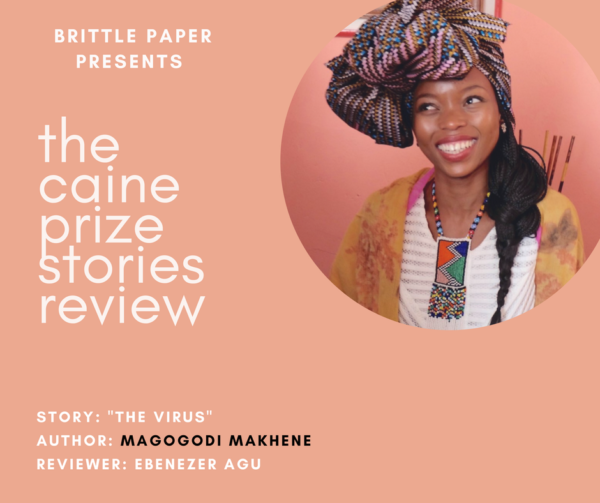It is a Brittle Paper tradition to review the five stories shortlisted for the Caine Prize. Through this, we hope to open up conversations around the stories, to find out what is interesting or innovative about them. Following our first, second and third reviews, we bring you our fourth #CainePrize2017 story review: Magogodi Makhene’s “The Virus.”
Magogodi oaMphela Makhene was born in Soweto, raised in Johannesburg, and lives in New York. She holds graduate degrees from New York University, where she was a Reynolds Fellow for Social Entrepreneurship, and the Iowa Writers’ Workshop, where she was a Truman Capote Fellow and taught Creative Writing. Her work was awarded First Prize for the Elie Wiesel Prize in Ethics. In 2016, she won the David Relin Prize for Fiction. She is currently completing a collection of inter-woven short stories exploring the inner lives and loves of ordinary South Africans making a life in a time and place most often inhospitable to their journeys.
Her shortlisted story, “The Virus,” is reviewed by Ebenezer Agu.
*
Caine Prize 2017 Story Review: Magogodi Makhene’s “The Virus”
Even though Magogodi Makhene’s “The Virus” opens in a conversational manner, its narrator serves up an initial indifference for a story wrought in high imagination and complexity. An indifference that quickly leaves but not without morphing into smugness, and a smirk, and hurt, and disillusionment and, towards the end, a nauseating brokenness. This irregularity is benign and rubs off on its context: South Africa’s historical scrambles mainly—skirmishes between the Boers, other white foreigners, and the indigenous blacks—and cyber warfare.
A heavily narrated story, the only character you really meet is the narrator who is unnamed, a veteran from the border after fighting to keep the Boer territories from two enemies: “rooi gevaar—commie alert” and “swaart gevaar—black terrs.” The narrator’s worry lies with the consequent immigration—mostly described as an invasion—of Americans after vicious cyber terrorism has sent them scurrying from their homes into Africa, a continent which “having never really been inter-webbed, is the one true refuge.” By the end of the story, the reader realizes that even the narrator’s fear has long overtaken him and he is more of a soiled spirit broken by two losses. The first loss is suffered against an enemy he perpetually feels superior to, the indigenous black South Africans; the second loss is the swindling of Boer farmlands by the American refugees.
The plot goes back and forth and involves intermittent digressions, perhaps in a bid to establish a structure that admits the general story through a single channel. Provinciality is obvious in both the story’s environment and its diction. “The Virus” is best appreciated with knowledge of South Africa’s history of hegemonies, as well as with the assistance of Google. There is a splatter of Afrikaans words, all of which are significant in understanding the attitude of the story and even the nature of some of the characters. A description of one of the characters goes thus: “I know better than ask the skelm old vrou, what is all this kak about?” And another:
“I admit, there was something vroulike about him. Smith, they called him. Ian Smith. Always managed to eat from his dixies with both the fork and the knife. Patted his mouth clean with a small white square he hand-washed nights, even out in the bush.”
To one unacquainted with Afrikaans, the core aspects of these characters, rendered as they are, might be vague until researched: “ou kerel,” “rooi gevaar and swaart gevaar,” “rooineks,” “oumagrootjie and oupagrootjie,” “bosbefok,” “braai,” “mooi.”
From this heaviness, Magogodi peers into a future of cyber terrorism. It progresses from something causing “a few weeks’ toilet pile up” to something “getting volk a man could understand. A power grid blew up, killing thousands of civilians within the hour”; “Viral computer infections blowing up dams…root commands raping entire intelligence systems….” In “The Virus,” cyber terror has intelligence as well as mortal effects; it is no longer only about America accusing Russia of influencing their presidential election, or Yahoo broadcasting a hack into over one thousand of their users’ accounts—it goes deep down to the destruction of lives and properties, and by so doing etches into the most common of human understanding.
It isn’t quite clear where to place “The Virus”: speculative fiction, realism, or simply highly imaginative fiction—the story borrows from each of these without really pinning itself down. The reversal of the immigration narrative is speculative, but what about realistic? Imagine this passage:
The Italians and Spaniards, we hear, even reverse engineered the Mediterranean fucked-fish-in-a-rowboat routine. I mean, picture that on the high seas—a bunch of sunfried Diegos and Ave Marias sardined into a sinking raft, praying their way from Sicily to Libya.
The war between the Boers and the black South Africans, whom the narrator derogatorily refers to as kaffirs, is history, realism, but it is also thwarted out of an exact rendering to fit into the peculiar structure of the story.
Magogodi Makhene’s unconventional storytelling style is strongest in the way she twists out South African politics into the artistic, allowing her work to achieve complexity with ease. The relationship of the narrator and the black South Africans is obviously skewed towards hurting the narrator’s individual and cultural consciousness. One can easily see through the hurt sense of self in the way the narrator talks about the “kaffirs.” But the narrator is not a political character (his xenophobia could be weighed, though), he is rather someone who, through his losses, has suffered disappointment and disillusionment, and his condition is more difficult because he seems to be the only one in the story aware of the deprivation his people suffer from the cyber war refugees who slyly take over their farms. The story has its centre in deprivation; the cyber warfare appears to be a precursor for this centre. Here the narrator expresses his bitterness:
And what started small… seems to me a growing cancer. Can’t step out a day without hearing another story of cyvivors outsmarting a Boer his entire farm—flock, stock and bride. At first, a fur coat traded for a little patch of earth… until entire farms switched hands for a few cases of rum, some rare ammunition and a kak promise, leaving Boere families squatters in their own fatherland. The situation is bad. Made worser by spineless Boers arse-creeping ‘round the refugees.
And here:
Of course, everyone would rather deny it, pretending the likes of this old Boer a conspiracy theory, but the ordinary truth of the fact is that while this cyberwar goes on, confusing the world, American cyvivors and they friends is busy colonizing the last white indigenous tribe of Africa.
And then this:
Well. It was just another braai at the spazashop celebrating our tribelessness. Nobody marks Van Riebeck Founder’s Day anymore. Or remembers how, on the Day of the Vow, the Lord made good His covenant with us, delivering the Zulus to our oupagrootjies’ barrels. Instead, we are hostage to everything foreign-born, pulling out all stops for they blerry Bastille Days and heathen Halloweens.
To pause and think about the narrator’s condition in relation to the indigenous South Africans, who are granted a place in the story through Enoch, might be to become curious about the narrator’s loss. This curiosity opens up whenever the narrator’s subjectivity eludes him without his awareness, as happens when he speaks of how the “rooineks” (the English) regard the Boers as “irreligious kaffir-enslavers.” And then Enoch, just before his death, gives the reason he has sold out his platoon:
Enoch brung me his family again…. He said he couldn’t watch them bow they heads forever in they own land. Couldn’t let us do with them and they children’s children what we’d done with his father, his father’s fathers.
Despite the narrator’s disregard for black South Africans, the story does not allow one the opportunity to be judgemental; it only grants the privilege to feel.
Makhene’s general unconventionality excuses her liberty with punctuation, diction, and sentence structuring, but the story would have done finer with a bit of visual polishing: justified pages, real dashes instead of the improvisation with double hyphens.
Stories on the Caine Prize shortlist do not necessarily represent the best short fiction from Africa—they simply represent the choices of the judges—but “The Virus” very much deserves the recognition it currently enjoys.
*
Read Magogodi Makhene’s “The Virus.”
**************
About the Author:
 Ebenezer Agu is a poet and nonfiction writer. He grew up in the market city of Onitsha, Nigeria.
Ebenezer Agu is a poet and nonfiction writer. He grew up in the market city of Onitsha, Nigeria.










Kay December 23, 2018 23:55
A difficult read.